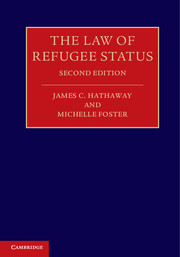Book contents
- Frontmatter
- Contents
- Acknowledgments
- Table of cases
- Table of treaties and other international instruments
- Abbreviations for courts and tribunals cited
- Introduction
- 1 Alienage
- 2 Well-founded fear
- 3 Serious harm
- 4 Failure of state protection
- 5 Nexus to civil or political status
- 6 Persons no longer needing protection
- 7 Persons not deserving protection
- Index
- References
Introduction
Published online by Cambridge University Press: 05 July 2014
- Frontmatter
- Contents
- Acknowledgments
- Table of cases
- Table of treaties and other international instruments
- Abbreviations for courts and tribunals cited
- Introduction
- 1 Alienage
- 2 Well-founded fear
- 3 Serious harm
- 4 Failure of state protection
- 5 Nexus to civil or political status
- 6 Persons no longer needing protection
- 7 Persons not deserving protection
- Index
- References
Summary
Refugee law may be the world’s most powerful international human rights mechanism. Not only do millions of people invoke its protections every year in countries spanning the globe, but they do so on the basis of a self-actuating mechanism of international law that, quite literally, allows at-risk persons to vote with their feet. This is because, as the United Nations High Commissioner for Refugees (“UNHCR”) has insisted, refugee status is not a status that is granted by states; it is rather simply recognized by them:
A person is a refugee within the meaning of the 1951 Convention as soon as he fulfils the criteria contained in the definition. This would necessarily occur prior to the time at which his refugee status is formally determined. Recognition of his refugee status does not therefore make him a refugee but declares him to be one. He does not become a refugee because of recognition, but is recognized because he is a refugee.
A person who is a refugee at international law is thus entitled in any of the nearly 150 state parties to the refugee regime to claim a powerful catalog of internationally binding rights – including not only critical civil rights, but also socio-economic rights and rights that enable pursuit of a solution to refugeehood. Because refugee status inheres by virtue of facts rather than formalities, the entitlement to these rights persists until and unless an individual is found not to be a refugee.
The portal to this uniquely valuable protection regime is the definition of a refugee codified in the 1951 Convention relating to the Status of Refugees, made both universal and applicable to contemporary refugees by the 1967 Protocol relating to the Status of Refugees (the “Convention refugee” definition). Article 1A(2) of the Convention provides that the term “refugee” shall apply to any person who
owing to well-founded fear of being persecuted for reasons of race, religion, nationality, membership of a particular social group or political opinion, is outside the country of his nationality and is unable or, owing to such fear, is unwilling to avail himself of the protection of that country; or who, not having a nationality and being outside the country of his former habitual residence as a result of such events, is unable or, owing to such fear, is unwilling to return to it.
- Type
- Chapter
- Information
- The Law of Refugee Status , pp. 1 - 16Publisher: Cambridge University PressPrint publication year: 2014
References
- 2
- Cited by



